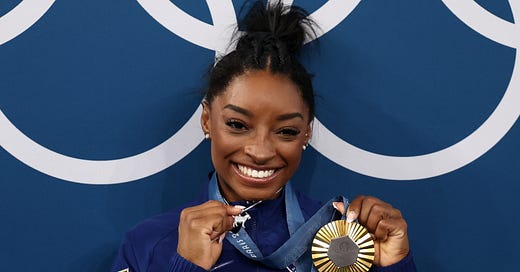I occasionally refer to my friend Bill Mallon as the most interesting man in the world. He’s a world-class surgeon, former pro golfer, and an Olympic historian.
When I asked if an Olympic medalist had ever won a Nobel Prize, this is the man who had the answer immediately. (Philip Noel-Baker took silver in the 1500-meters in 1920, and won the Nobel Peace Prize in 1959.)
I asked Bill to share a few Paris-relevant stats, and he sent a fascinating list. What jumped out to me is that three American women are either on, or have just ventured beyond, the cusp of Olympic-stats history:
Katie Ledecky
Tomorrow, Ledecky will compete in the 800m freestyle. She was unbeaten in the 800 free from 2010 to February of 2024 (!), when she lost to Canadian Summer McIntosh. If Ledecky wins the 800 tomorrow, she will become the first woman ever to win the same event at four Olympics.
Diana Taurasi
The 42-year-old Taurasi has won five gold medals as part of the U.S. basketball team. Taurasi is tied with Sue Bird for the most medals by an individual in any team sport in Olympic Games history. Bird is now retired, but Taurasi is balling in Paris. If she wins a medal of any color, she will stand alone among Olympians for medals earned by an individual in a team sport.
Simone Biles
Yesterday, Biles won gold in the individual all-around competition. She won the event in 2016, but withdrew from it in 2020. Her triumph yesterday makes her the first woman ever to win Olympic gold twice in the same artistic gymnastics event, but not at consecutive Games. Among men, only China’s Li Xiaopeng has done this, winning the parallel bars in 2000 and 2008.
…Finally, a few random Olympic tidbits I’ve found interesting:
Some of the athletes’ parents have been wearing heart rate monitors in the stands, and NBC will occasionally display their heart rate. I saw gymnast Hezly Rivera’s father hit a bpm of 180 — while sitting stone still and watching his daughter. I hadn’t realized that was possible without moving!
Guatemala has participated in fifteen Summer (and one Winter) Olympics, and never won a gold medal. On Wednesday, Adriana Ruano Oliva — a former elite gymnast who switched sports after a spinal injury — won the country’s first gold medal in trap shooting. She competed at the previous Olympics, but finished last. This time, she set an Olympic record, hitting 45 out of fifty flying targets.
Speaking of trap shooting, half of the women in the final were left-handed, while fewer than ten percent of women in general are lefties. In some sports, this phenomenon is well known. Fencing has, on multiple occasions, had three lefties on the medal stand, and has historically had tremendous overrepresentation of lefties at the highest levels. The main reason seems to be a “frequency-dependent” advantage. That is: because lefties are rare, athletes at most levels see them less often and thus have a relatively sparse mental database of their movement patterns. Some scientists have argued that the reason humans have a stable but low proportion of lefties is due to the historical advantage it conferred for hand-to-hand combat. How left-handedness would help in trap shooting, however, is a mystery to me. I have some bad hypotheses, but curious to hear ideas in the comments. Of course: could just be chance!
Chilean table tennis player Zeng Zhiying, who left China 35 years ago, made her Olympic debut in Paris at the tender age of 58. She may not be the oldest Olympic debutante in Paris, though. Sixty-one-year-old Canadian equestrian Jill Irving was set to make her Olympic debut, but her horse, Delacroix, hasn’t been feeling well, so Irving was replaced on the Canadian roster. She will remain with the team as an alternate, though, and plans to aim for 2028.
Thanks for reading. If you found these stats interesting, please share this post.
Until next time…
David
P.S. If you missed the last post on AI voice clones, you can check it out here.







Thank you for the post.
I work in shooting and was at the Olympics with a national shooting team and witnessed the womens trap final.
The Men's trap Gold medalist was also shooting left handed but it is interesting to note that he is actually naturally right handed but his shooting style was picked due to left eye dominance. Conversely one of our female trap shooters shoots right handed (as she is naturally right handed) but is Left eye dominant.
Within our Rifle elite programme we have 60% of our Olympic Female shooters are left handed but they all shoot right handed.
A theory we have is that equipment when starting shooting is predominantly set up all for right handers and therefore they learn to shoot right handed as that is the only option, then when at a sufficient skill level to compete they can't unlearn the original position they have practiced.
There is less representation across our female pistol shooters - ~40% - but still greater than in the population.
I like some of @Murasak3y's thoughts on the trend as well
Here are my theories on the left handed shooters: The left arm shares many nerves with the heart. Shooting requires relaxation and concentration. if a left hand shooter has a strong connection with their left arm, then maybe the connection with the heart is stronger as well. We must remember the heart has its own nervous system and there’s only one, meaning this proliferation of nerves is not matched on the right side, or found on the way to the right arm/hand. Maybe firing the left hand provides a stronger and more direct nerve pathway by proxy of its relationship to the heart eliminating potential error from nerves having to travel further. Also, could this stronger relatinship with the heart mean they are able to better calm themselves? Could it mean they are more easily able to make sure they shoot when the heart is not creating vibrations or use the hearts vibrations to improve their timing? Does the brain and nervous system have a more direct connection to the left hand/arm?
Maye left handed people are able to reach deeper states of relaxation due to thaving used their right brain more, the part of the brain associated with relaxation and the parasypathetic nervous system vs the logical and thinkingn left brain, with thinking many times being the predecessor to stress and overthinking aka fear being a barrier to optimal performance. Could a stronger right brain due to being left handed result in being more resilient to stress? Also, the right brain is associated with spatial awareness, so if the right brain is stronger in left handed people due to their use and training of their left side, then maybe they have improved spatial awareness as well, which would help with shooting.
being left handed in a society built for right handers means lefties are forced to do many things right handed despite the left being their dominant hand. Does this lead to a greater amount of ambidexterity in left handed people? Do lefties have better physical and/or mental balance than right handers because of being forced to use their non dominant hand? Meanwhile, right handed people could have an imblaanced, extreme right hand dominance encouraged by and reinforced by the societal environment. We must remember that hands have a great amount of nerve endings in them, taking up much space in our brain, and our brain will no doubt be affected mentally and physically by the use of our hands over time, or the sending of blood to and from the nerves and cells in those areas, with nerve connections being strengthened or weakened over time, not only locally in the hand, but in the brain as well.
Objects we see in our left visual field map to our right brain, which is associated with spatial awareness. Left handed shooters are more likely to line stuff up with left hip, left foot, and left shoulder, placing objects on the left side of their spine and in their left visual field. Does this give natural advantages in tasks like shooting, where the right brain’s spatial awareness is so important?